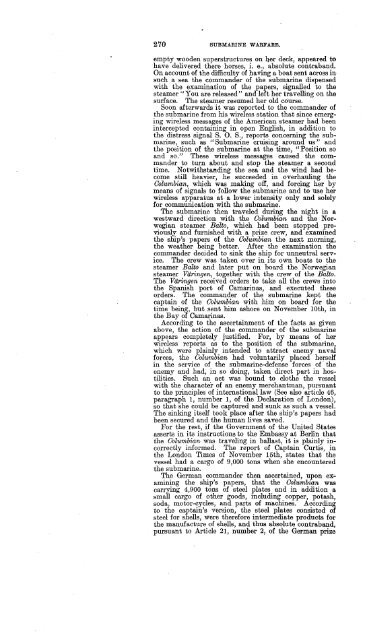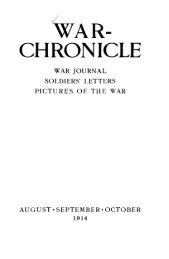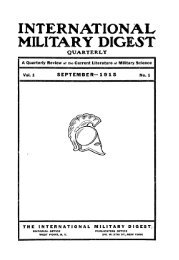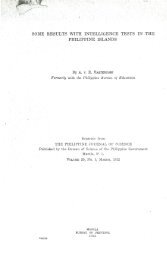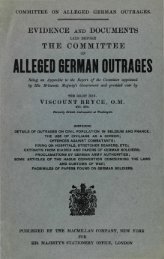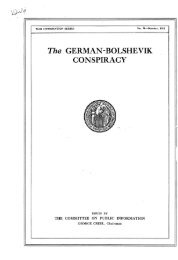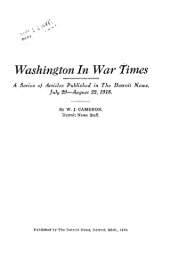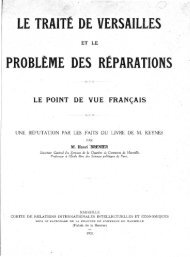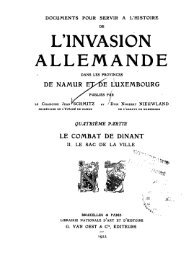DEPARTMENT OF STATE.
DEPARTMENT OF STATE.
DEPARTMENT OF STATE.
Create successful ePaper yourself
Turn your PDF publications into a flip-book with our unique Google optimized e-Paper software.
270 SUBMARINE WABFABE.<br />
empty wooden superstructures on her deck, appeared to<br />
have delivered there horses, i. e., absolute contraband.<br />
On account of the difficulty of having a boat sent across in<br />
such a sea the commander of the submarine dispensed<br />
with the examination of the papers, signalled to the<br />
steamer " You are released" and left her travelling on the<br />
surface. The steamer resumed her old course.<br />
Soon afterwards it was reported to the commander of<br />
the submarine from his wireless station that since emerging<br />
wireless messages of the American steamer had been<br />
intercepted containing in open English, in addition to<br />
the distress signal S. O. S., reports concerning the submarine,<br />
such as "Submarine cruising around us" and<br />
the position of the submarine at the time, "Position so<br />
and so." These wireless messages caused the commander<br />
to turn about and stop the steamer a second<br />
time. Notwithstanding the sea and the wind had become<br />
still heavier, he succeeded in overhauling the<br />
Columbian, which was making off, and forcing her by<br />
means of signals to follow the submarine and to use her<br />
wireless apparatus at a lower intensity only and solely<br />
for communication with the submarine.<br />
The submarine then traveled during the night in a<br />
westward direction with the Columbian and the Norwegian<br />
steamer Balto, which had been stopped previously<br />
and furnished with a prize crew, and examined<br />
the ship's papers of the Columbian the next morning,<br />
the weather being better. After the examination the<br />
commander decided to sink the ship for unneutral service.<br />
The crew was taken over in its own boats to the<br />
steamer Balto and later put on board the Norwegian<br />
steamer Varingen, together with the crew of the Balto.<br />
The Varingen received orders to take all the crews into<br />
the Spanish port of Camarinas, and executed these<br />
orders. The commander of the submarine kept the<br />
captain of the Columbian with him on board for the<br />
time being, but sent him ashore on November 10th, in<br />
the Bay of Camarinas.<br />
According to the ascertainment of the facts as given<br />
above, the action of the commander of the submarine<br />
appears completely justified. For, by means of her<br />
wireless reports as to the position of the submarine,<br />
which were plainly intended to attract enemy naval<br />
forces, the Columbian had voluntarily placed herself<br />
in the service of the submarine-defense forces of the<br />
enemy and had, in so doing, taken direct part in hostilities.<br />
Such an act was bound to clothe the vessel<br />
with the character of an enemy merchantman, pursuant<br />
to the principles of international law (See also article 46,<br />
paragraph 1, number 1, of the Declaration of London),<br />
so that she could be captured and sunk as such a vessel.<br />
The sinking itself took place after the ship's papers had<br />
been secured and the human lives saved.<br />
For the rest, if the Government of the United States<br />
asserts in its instructions to the Embassy at Berlin that<br />
the Columbian was traveling in ballast, it is plainly incorrectly<br />
informed. The report of Captain Curtis, in<br />
the London Times of November 15th, states that the<br />
vessel had a cargo of 9,000 tons when she encountered<br />
the submarine.<br />
The German commander then ascertained, upon examining<br />
the ship's papers, that the Columbian was<br />
carrying 4,900 tons of steel plates and in addition a<br />
small cargo of other goods, including copper, potash,<br />
soda, motor-cycles, and parts of machines. According<br />
to the captain's version, the steel plates consisted of<br />
steel for shells, were therefore intermediate products for<br />
the manufacture of shells, and thus absolute contraband,<br />
pursuant to Article 21, number 2, of the German prize


